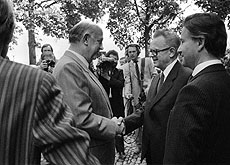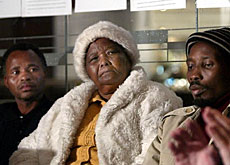Economic interests made Swiss shy of sanctions

Switzerland’s failure to impose sanctions on South Africa’s apartheid regime was not legally justified, according to a study.
Switzerland let economic interests dictate its policy towards Pretoria, says the report compiled by Jörg Künzli on behalf of the Swiss National Science Foundation.
“Between law and politics” is one of ten studies commissioned as part of national research into relations between the two countries and Switzerland’s policy towards South Africa between 1976 and 1994.
The Swiss government chose not to apply United-Nations imposed sanctions on the country, basing this decision partly on Switzerland’s policy of neutrality.
During the period in question Switzerland’s criticism of Pretoria went only as far as a condemnation of racial segregation and non-recognition of the occupation of Namibia, as well as the apartheid regime’s homelands policy.
But legal expert Künzli says the rejection of sanctions was an economically motivated decision aimed less at protecting business relations than at promoting bilateral trade.
The government and parliament deliberately failed to close loopholes in the law – or delayed doing so – to allow trade relations to continue, the researcher claims.
Weapons and trade
In his report he concludes that Bern clearly violated its “minimal human rights obligations” in its dealings with the apartheid state.
Künzli accuses Switzerland of breaking a binding 1977 UN weapons embargo in the “key areas” of the transfer of war material and nuclear technology. This was despite the fact that the Swiss government had 14 years previously unilaterally declared a ban on exports of war material to South Africa.
The export of so called dual-use goods that could be used for civilian or military purposes continued, as did the transfer of know-how and cooperation in nuclear research.
He gives the example of PC-7 aircraft delivered to the Bophutatswana homeland and the export of explosives and chemicals to South Africa.
Künzli says that although Switzerland was not a UN member and therefore was not bound by the sanctions, it should have respected them out of solidarity.
An earlier study by Bern University historian Peter Hug, details of which were published in March, found that Switzerland was involved in more illegal arms deals with apartheid-era South Africa than had previously been believed.
Hug’s study was also carried out on behalf of the Swiss National Science Foundation.
swissinfo with agencies
Jörg Künzli’s study is one of ten reports commissioned by the Swiss National Science Foundation to look at relations between Switzerland and South Africa.
The government charged a team of 40 researchers with examining economic ties, contacts between churches, the international context, the public perception of the policy towards Pretoria and Switzerland’s attitude towards UN sanctions.
The research should have been completed by 2003, but the work was delayed by a government decision to limit access to archives.
The final report should be presented this autumn.

In compliance with the JTI standards
More: SWI swissinfo.ch certified by the Journalism Trust Initiative


You can find an overview of ongoing debates with our journalists here. Please join us!
If you want to start a conversation about a topic raised in this article or want to report factual errors, email us at english@swissinfo.ch.